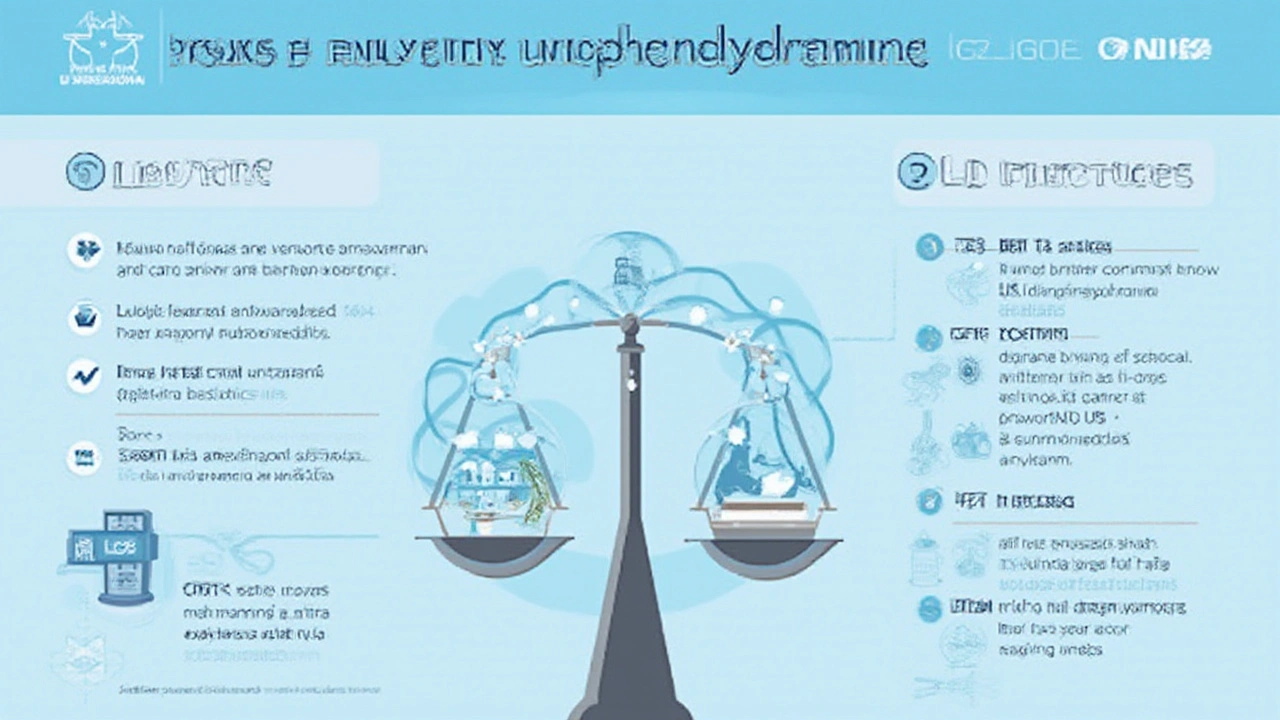Picture this: you’re lying in a hospital bed, nerves on edge and mind racing. The nurse bustles in and, instead of the go-to anxiety meds you expected, you get handed a tiny pink pill—Benadryl, or diphenhydramine. You might do a double-take. Isn’t that just for allergies or sleep? Turns out, hospitals reach for this old-school antihistamine in ways your family doctor probably never would. It’s not because hospital teams are stuck in a time warp. There’s a messy reality behind why inpatient orders for diphenhydramine swerved away from outpatient best practice, and it’s got more to do with habit, logistics, and short-term problem-solving than most patients realize. The gap between hospital and regular doctor recommendations isn’t just quirky: it can shape recovery, risk, and even hospital safety.
Why Hospitals Prescribe Diphenhydramine for Anxiety
Ever noticed how hospital protocols sometimes don't look much like those in clinics or private practices? When it comes to managing anxiety, this clash becomes pretty clear. Instead of SSRIs, benzodiazepines, or buspirone—the usual suspects in outpatient anxiety care—hospital docs and nurses often reach for diphenhydramine. The logic isn’t always about science. Sometimes it’s pure convenience: Benadryl is cheap, familiar, and lives in every hospital med cart. If someone’s restless, can’t sleep, or a bit panicky, a quick order goes in. But comfort with diphenhydramine has roots in earlier eras, when sedation for ‘agitated’ patients was standard operating procedure. Even now, electronic medical record order sets sometimes nudge clinicians toward this older routine, even as guidelines have shifted elsewhere.
Don’t get it twisted: this isn’t some nefarious plan. Hospitals are high-pressure environments, where immediate calming can prevent injuries, falls, or patient distress. For a harried nurse or intern, diphenhydramine feels like a low-risk, fast-acting fix. There’s also an ongoing struggle to manage patients who can’t take benzodiazepines (think the elderly, delirious, or those at risk of addiction). In these tough cases, Benadryl flies under the regulatory radar in a way lorazepam or alprazolam don’t. It’s seen as ‘safe,’ even though that assumption hasn't stood up to scrutiny in recent years.
How often does this actually happen? A 2023 U.S. study of over 400 hospitals found up to 30% of inpatients with 'anxiety' or sleep disruptions received a diphenhydramine order during their stay, compared to only 6% in outpatient clinics. In units like med-surg, the number is even higher. Many hospitals include diphenhydramine on ‘as needed’ med lists for symptoms ranging from mild insomnia to full-on panic. Outpatient docs would raise a brow at that—but inside hospital walls, it's the norm.

The Risks of Diphenhydramine for Anxiety: Real Data and Clinical Realities
Here’s the catch: what may ‘calm’ a patient in a noisy ward isn’t always what’s safest for anxiety—or the patient’s overall health. Diphenhydramine’s side effects are legend. Besides the grogginess (sometimes welcome), it’s notorious for messing with thinking, balance, heart rhythm, and even bladder function. Hospitalized folks—especially the elderly, people with dementia, or those on multiple meds—face real risks of delirium, falls, or nasty reactions when Benadryl is used too freely. The sedative haze can linger long after it’s needed, making mornings rough and slowing recovery.
Data from the American Geriatrics Society’s Beers Criteria—a gold standard for what meds older adults should avoid—puts diphenhydramine firmly on the naughty list. They flat-out recommend against its use for anxiety or sleep, due to strong anticholinergic effects (think: confusion, constipation, urinary retention). One large 2022 observational study from Ontario tracked over 10,000 inpatient seniors and found those given diphenhydramine were 2.3 times more likely to fall during their stay. The association was even higher for patients already showing signs of confusion or delirium. There's a famous saying: "Start with Benadryl, end up with restraints and a sitter." Not exactly what you were hoping for when asking for help with nerves.
The problem? The danger isn’t just theoretical. Hospitals have reported increases in ‘hospital-acquired complications’ like fall injuries, prolonged stays, and even cardiac incidents linked to powerful antihistamines. The FDA has issued warnings about combining diphenhydramine with other sedating meds, particularly opioids. More than one hospital’s quality-improvement committee has tallied up the costs—literally thousands of dollars per fall—and started pulling diphenhydramine off order sets. Despite tougher stances, though, old habits die hard. Some staff see Benadryl as gentler than alternatives, not fully grasping that safer, targeted anxiety meds can often spare patients worse side effects.

Outpatient Recommendations: How Anxiety Management Differs Outside Hospital Walls
If you ask outpatient psychiatrists or primary care providers, the mood swings the other direction. Routine use of diphenhydramine for anxiety? Most would say no way. Professional guidelines—from the American Psychiatric Association to the NICE standards in the UK—leave no room for antihistamines like Benadryl in the treatment of generalized anxiety disorder, panic attacks, or chronic restlessness. Instead, outpatient providers reach for a toolbox filled with proven therapies: SSRIs and SNRIs, cognitive behavioral therapy, mindfulness training, and, sometimes, short bursts of benzodiazepines (with careful monitoring to avoid dependence).
A big reason for this split? Outpatients aren’t hopping beds at 2 a.m.; they have time for in-depth evaluations, follow-up appointments, and therapy referrals. Diphenhydramine’s risks, especially with repeated use, outweigh any short-term benefit for chronic anxiety sufferers. Plus, outside the hospital, regular follow-up means doctors will notice if a patient’s anxiety isn’t improving—or if side effects are creeping in. In contrast, hospital clinicians may hand out Benadryl as a quick fix, rarely seeing the lasting fallout (like new falls or cognitive slip-ups).
There’s also no shortage of safer alternatives for those needing short-term relief: hydroxyzine (another antihistamine, but without the same brain-fog effects), melatonin for sleep, or even short courses of non-addictive sleep aids. If you want a deep dive into this topic—including safer OTC picks and what to watch for—here’s a straight-talking resource: prescription Benadryl for anxiety. The point is, outpatient care puts a laser focus on what works long-term, not just what's handy in a pinch.
This divergence matters for patients bouncing between hospital and home. A person who received Benadryl during a hospital admission for anxiety might leave assuming it’s a safe answer for future nerves—leading to unintentional misuse outside. Outpatient docs face the tricky task of untangling hospital-acquired habits, clarifying risks, and nudging care back toward options proven by modern research. The key is making sure both hospital and outpatient teams are talking—and that what starts as a stopgap inside doesn’t become a dangerous go-to back home.
| Medication | Setting (Inpatient vs Outpatient) | Common Use for Anxiety | Serious Risk Profile |
|---|---|---|---|
| Diphenhydramine | Inpatient | Yes (30% of inpatients w/ anxiety get) | Falls, delirium, arrhythmia, sedation |
| SSRIs/SNRIs | Outpatient | Yes | GI upset, sexual dysfunction, withdrawal |
| Benzodiazepines | Both | Limited (w/ caution, not for elderly) | Addiction, sedation, respiratory depression |
| Hydroxyzine | Outpatient | Sometimes | Drowsiness, less anticholinergic effect |
Next time you or someone you love lands in the hospital for anxiety and the team reaches for diphenhydramine, ask about alternatives. Remind them you know the numbers, the risks, and the way habits have a funny way of sticking around. Medicine moves fast—but some routines lag far behind what’s best for real people trying to beat anxiety, get well, and avoid bitter detours on the road to recovery.



19 Comments
Dade Hughston
July 11, 2025 AT 17:05Benadryl for anxiety lol imagine being so broke you gotta give people allergy meds to chill out
Keerthi Kumar
July 13, 2025 AT 01:54Interesting how we normalize convenience over care-especially in systems that claim to prioritize healing. In India, we’ve seen this too: cheap, familiar drugs get used not because they’re best, but because they’re *available*. But here’s the deeper truth: it’s not just about medication-it’s about how we treat human distress. Is a sedated patient a calm patient? Or just a silenced one? We must ask: who benefits from this habit? The nurse? The hospital budget? Or the person lying there, terrified, wondering why their mind feels like it’s wrapped in cotton wool? This isn’t medical care-it’s emotional containment. And it’s time we called it out.
Jim Peddle
July 13, 2025 AT 13:49Big Pharma doesn’t want you to know this but diphenhydramine is a controlled substance in disguise-pharmaceutical companies push it because it’s generic and unregulated. The FDA? They’re in bed with the hospitals. You think they care about your grandma falling? No. They care about liability. That’s why they let hospitals keep using it. Meanwhile, real anxiety meds like SSRIs are priced like luxury cars. Coincidence? I think not. This is systemic manipulation disguised as medical protocol.
S Love
July 15, 2025 AT 01:49Great breakdown. This is exactly why we need better communication between inpatient and outpatient teams. I’ve had patients come in after a hospital stay convinced Benadryl is their ‘anxiety solution’-and then we’re stuck undoing the habit. It’s not just about prescribing the right drug-it’s about educating the patient, the family, and the staff. Hospitals need to audit their PRN lists. Outpatient providers need to ask: ‘What did they give you in the hospital?’ We can fix this-but only if we stop treating it as a ‘minor’ issue.
Pritesh Mehta
July 15, 2025 AT 03:26Western medicine is so obsessed with ‘evidence’ that it forgets tradition. In India, we’ve used antihistamines for centuries to calm the nerves-why? Because they work. You think your fancy SSRIs are better? They take weeks. Benadryl works in 20 minutes. And yes, it causes drowsiness-but isn’t that what people need? A break from the noise? You’re pathologizing comfort. This isn’t malpractice-it’s pragmatism. Modern doctors are too scared to use anything that doesn’t come with a 100-page manual.
Billy Tiger
July 16, 2025 AT 02:32So hospitals are using Benadryl because they’re lazy and the FDA is corrupt? Yeah I buy that. No one wants to deal with real mental health care. Just slap a pink pill on someone and call it a day. Meanwhile the real solution is to shut down hospitals and let people meditate in nature. Simple. Clean. No drugs. No bureaucracy. Just peace
Katie Ring
July 17, 2025 AT 16:05It’s not about Benadryl. It’s about how we treat people in crisis. We don’t ask why they’re anxious-we just try to make them quiet. That’s the real problem. The system doesn’t want to sit with discomfort. It wants to chemicalize it. And that’s violence. Silent. Legal. Institutionalized violence.
Adarsha Foundation
July 18, 2025 AT 03:24I appreciate the nuance here. In my work with elderly patients in rural India, we’ve seen how easily sedatives get misused. But I also know nurses are overwhelmed. Maybe the answer isn’t to blame them-but to give them better tools. Training, time, and alternatives like melatonin or guided breathing apps could make a huge difference. Let’s fix the system, not just the prescription.
Alex Sherman
July 18, 2025 AT 08:54Of course hospitals use Benadryl. It’s the only thing that doesn’t require paperwork. The real scandal? That we’ve allowed this to become normal. We’ve traded dignity for efficiency. And we call it ‘healthcare.’
Oliver Myers
July 18, 2025 AT 10:34Thank you for writing this. I’ve seen this exact scenario with my mom-hospital gave her Benadryl for ‘anxiety’ after her surgery, and she was confused for three days. I didn’t know it was a thing until I researched it. Please, if you’re in the hospital and they offer Benadryl for anxiety, ask: ‘Is there a safer option?’ You’d be surprised how many nurses will say, ‘Honestly? Yeah, we should’ve given you hydroxyzine.’ We just need to start asking.
John Concepcion
July 20, 2025 AT 00:47Lmao so now we’re treating anxiety like a cold? ‘Take two Benadryl and call me in the morning’? What’s next, aspirin for PTSD? This is why people don’t trust medicine. It’s not science-it’s triage with a side of laziness.
Caitlin Stewart
July 20, 2025 AT 15:31I work in a hospital pharmacy. We’ve started removing Benadryl from our anxiety PRN list. It’s been hard. Some nurses resist. But the fall rates dropped 40% in 6 months. The real win? Patients started asking for better options. Change is slow-but it’s possible. We just need to stop pretending convenience is care.
Emmalee Amthor
July 20, 2025 AT 20:15There’s something beautiful about how medicine forgets its own history. Benadryl was never meant to be a psychiatric drug. It was a miracle for hay fever. Now we use it to mute human pain. That’s not progress. That’s surrender. We’ve outsourced emotional regulation to a pill that makes you forget your own name. Maybe the real anxiety isn’t in the mind-it’s in the system that thinks this is acceptable.
Leslie Schnack
July 21, 2025 AT 12:28Can someone explain why hydroxyzine isn’t used more? It’s an antihistamine too, but with fewer anticholinergic effects. Why is Benadryl still the default? Is it just because it’s cheaper? Or is there something I’m missing?
Saumyata Tiwari
July 21, 2025 AT 22:04Western medicine is failing because it ignores holistic approaches. In India, we use herbs, breathwork, and community. But you? You want a pill for everything. Benadryl is just the latest symptom of your broken system. You don’t heal minds-you suppress them.
Anthony Tong
July 23, 2025 AT 03:33According to CDC data, 78% of hospital-acquired delirium cases in patients over 65 are linked to anticholinergics. Benadryl is the #1 culprit. This isn’t anecdotal. It’s epidemiological. And yet, hospitals continue to prescribe it. Why? Because the liability is lower than the cost of hiring more staff. This is a cost-cutting measure dressed in white coats.
Roy Scorer
July 24, 2025 AT 05:25You think this is bad? Wait until you find out they’re using promethazine for ‘mood stabilization’ in the psych ward. And no one talks about it. The system is designed to keep you docile. Benadryl is just the tip of the iceberg. They don’t want you awake. They want you quiet. They want you compliant. And they’ll use whatever works-even if it breaks you.
Marcia Facundo
July 25, 2025 AT 10:33My sister was given Benadryl for panic attacks during her hospital stay. She didn’t sleep for three nights after because she was so wired from the withdrawal. No one told us it could do that. Just another silent consequence.
Ajay Kumar
July 27, 2025 AT 01:14Actually, Benadryl is better than SSRIs. At least it doesn’t make you feel like a zombie for six months. SSRIs kill libido, make you gain weight, and sometimes make people suicidal. Benadryl? You sleep. You wake up. You’re fine. Sure, you might stumble-but at least you’re not crying in the shower because your brain forgot how to feel happy. Stop pretending modern meds are safer. They’re just more expensive.